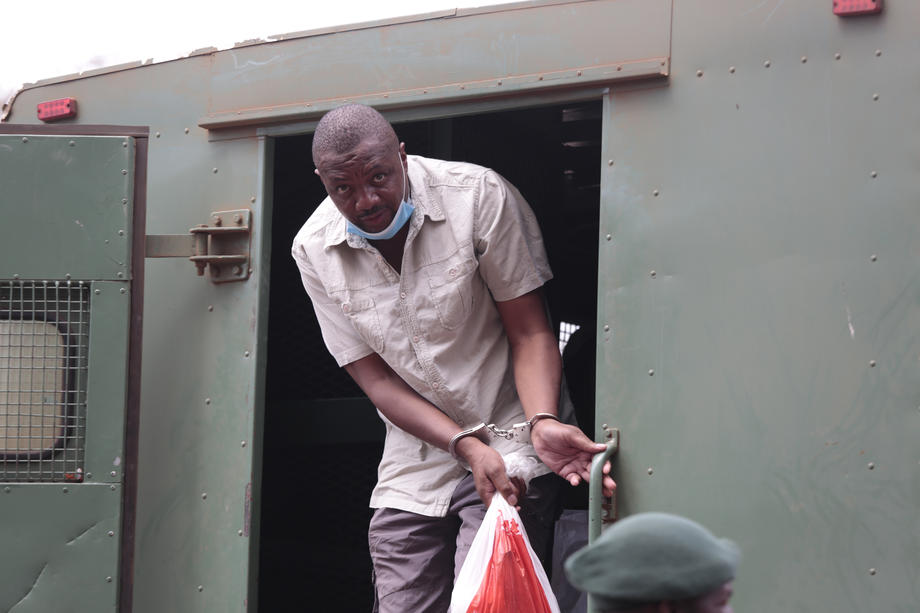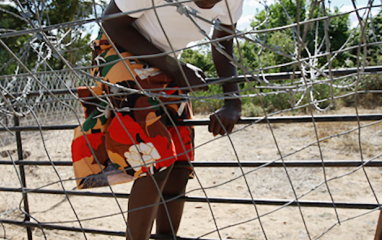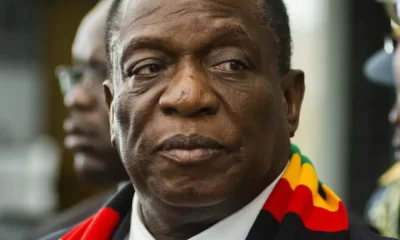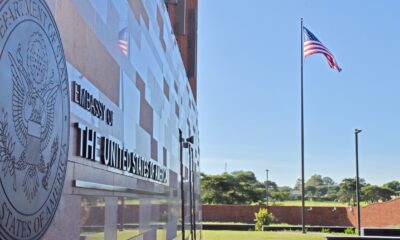TAONA DENHERE
THE American sociologist and philosopher Lewis Mumford once said: “A man of courage never needs weapons, but he may need bail.”
The deplorable albeit unsurprising optics of senior Citizens’ Coalition for Change leaders and members of Parliament Job Sikhala and Godfrey Sithole in leg irons and being frog-marched into Rotten Row magistrates’ court in Harare has again recast the spotlight on the controversial, divisive and politicised issue on who is entitled to bail in our courts.
Over the last three years, the magistrates’ courts have been at the centre of this controversial issue regarding the awarding of bail. Thus, there have been legal inconsistencies and eyebrow-raising decisions made by magistrates in terms of who qualifies or does not qualify for bail. We have been witnessing a consistent pattern, whereby opposition leaders, legislators and activists, together with civil society leaders and real or perceived government critics are consistently denied bail by the magistrates. However, on the other hand there has also been another concerning systematic pattern whereby senior Zanu PF officials, government ministers and Zanu PF politically exposed persons (PEPs) are awarded bail without much ado by the same magistrates.
Therefore, this opinion piece will attempt to rearticulate the politics and the shenanigans regarding the politicisation and the partiality of bail application. Thus, I will argue that notwithstanding the fact that it is a legal and constitutional requirement that the accused or the defendant is entitled to be awarded bail upon successful application for it, for certain sections of the Zimbabwean citizenry the awarding of bail has been at the discretion and mercy of questionable magistrates. It has not escaped the public’s notice that Zanu PF’s politically exposed persons are routinely granted bail regardless of the severity of the allegations against them.
What is bail?
Bail is a legal provision that allows the accused who has been remanded for trial at a later scheduled date to be allowed to exercise his or her legal and constitutional liberties until the commencement of trial. Therefore, when the accused is granted bail, he or she would have entered a contractual obligation known as the recognisance. That is he or she will exercise their liberties on a legally binding condition that they pay a sum of money in the event of defaulting on their court appearance on the specified date, time and place for their trial or further remand.
Accordingly, once the accused person is granted bail, he or she is legally protected from deprivation of liberty unless they have violated and disregarded the bail conditions or unless the bail bond is terminated. Moreover, the right to bail is undergirded by section 50(1) (d) of the Zimbabwean constitution which stipulates that a person who has been arrested:
“must be released unconditionally, or on reasonable conditions, pending a charge or trial, unless there are compelling reasons justifying their continued detention”.
Additionally, section 117(1) of the Criminal Procedure and Evidence Act provides that:
“A person who is in custody in respect of an offence shall be entitled to be released on bail at any time after he or she has appeared in court on a charge and before sentence is imposed, unless court finds that it is in the interests of justice that he or she should be detained in custody”.
Thus, the applying process and granting of bail is underscored by the rule of law principle of presumption of innocence until proven guilty by a court of law. That is, the accused should not be deprived of their constitutional and civil liberties until they have been convicted of their crimes. This principle is highlighted by the African Charter on Human and Peoples` Rights, article 7(1) which underlines: “the right to be presumed innocent until proven guilty by a competent court or tribunal”. Zimbabwe is a party to the African Charter on Rights.
However, in some extreme circumstances the state may believe that the only realistic way the accused may guarantee that he or she may face trial is by keeping them remanded in custody. This normally applies to high-profile crimes of murder, terrorism and treason. Where public and national security might be at a greater risk if the accused is released on bail.
Moreover, bail can also genuinely be denied in cases where there is high risk of the accused absconding and also where there is a greater likelihood that the accused will intimidate and threaten the witnesses. Nonetheless, it would be a travesty of justice if bail is denied a person who will neither abscond from trial nor violate any bail conditions.
Suffice it to say that the Zimbabwean government is a signatory to the the pre-trial rights enshrined in The International Covenant on Civil and Political Rights (ICCPR), particularly article 9(3) which stipulates that:
“Anyone arrested or detained on a criminal charge shall be brought promptly before a judge or other officer authorised by law to exercise judicial power and shall be entitled to trial within reasonable time or to release. It shall not be the general rule that persons awaiting trial shall be detained in custody, but release may be subject to guarantees to appear for trial, at any other stage of the judicial proceedings and should arise, for execution of the judgement”.
Some animals are more equal than others
The section 56(1) of the Zimbabwean constitution provides that: “All persons are equal before the law and have a right to equal protection and benefit of the law”. This is coupled with the fact that article 14(1) of the ICCPR provides
that “All persons shall be equal before the courts and tribunals”. Article 14(1) is read and operationalised together with article 26 of the ICCPR which stipulates that: “All persons are equal before the law and are entitled without any discrimination to the equal protection of law”. Moreover, article 3 of the African Charter provides that: “Every individual shall be equal before the law and entitled to equal protection of the law”.
Notwithstanding all this robust constitutional and legal architecture, Zimbabwe’s judicial system still has an institutionalised Orwellian (in)justice system whereby some political animals and individuals are more equal than others, in total disregard for the proverbial scales of Lady Justice. Thus, over the last three years we have witnessed a consistent pattern and culture of injustice, when it comes to the application for and granting of bail to opposition activists, civil society activists and the government critics by the magistrates.
The magistrates have weaponised and instrumentalised the denial of bail to government critics, opposition and civil society activists as a punitive extralegal measure despite the fact that bail is a legal and constitutional requirement for the accused. Bail is not supposed to be punitive in character. The quantum of bail or the refusal of the bail must not be motivated by the inclination to inflict punishment or to act as a deterrent to would-be offenders.
Accordingly, the majority of cases that are brought before the magistrates by the state against opposition members, civil society activists and government critics are
prima facie as a result of trumped up and baseless charges that lack evidentiary support to result in both sentencing and conviction. Cognizant of this fact, the Zanu PF government, as part of its authoritarian consolidation gameplan, systematically denies bail to its opponents and uses it as a form of punitive pre-trial sentence. Thus, the systematic denial of bail to government critics by the magistrates is now facilitating de facto imprisonment.
There is the high-profile case of Joana Mamombe, Cecilia Chimbiri and Netsai Marova, who were abducted, tortured and sexually assaulted by alleged state security operatives. They were subsequently arrested on 10 June 2020 charged with section 31 (a)(1)(iii) of the Criminal Law Act, namely communicating or publishing a false statement prejudicial to the state as well section 184(1)(f) of the Criminal Law Act, namely defeating or obstructing the course of justice as defined in section 184(1)(f). They were denied bail on 15 June and remanded in custody until 26 June.
Whilst in custody they were denied access to food from their relatives. Since then they have been re-arrested numerous times and refused bail and then belatedly awarded bail and then kept on perpetual remand, with their trial failing to take place or if it takes place, the state will continue to employ delaying tactics designed to defeat the course of justice, thereby keeping the accused in the vicious circle of persecution through prosecution.
This same template has also been deployed against the student activist Alan Moyo, who spent 72 days on pre-trial detention without bail, only to be released on 19 February 2021. However, there is also a high-profile case of investigative journalist Hopewell Chin’ono (pictured), which demonstrates the pinnacle of state-sanctioned vindictive and malevolent persecution by prosecution. Chin’ono spent a combined 82 days on pre-trial detention within the notorious and inhumane prison systems of Zimbabwe, including in the dreaded Chikurubi Maximum Security Prison.
Chin’ono was initially arrested in July 2020 on trumped-up charges of incitement to participate in public violence on allegations of violating section 187(1)(a) as read together with section 37(1)(a)(i) of the Criminal Law [Codification and Reform] Act. However, his arrest came hard on the heels of explosive investigative work Chin’ono had conducted, alongside other journalists, to expose and unpack the infamous Draxgate corruption scandal that involved the disgraced former minister of Health and Child Welfare Obadiah Moyo, Zanu PF politically exposed person Delish Nguwaya and Drax International. On these allegations, Chin’ono spent 45 days on pre-trial detention, in Chikurubi. It was also on the same criminal allegations that opposition leader Jacob Ngarivhume spent 45 days on pre-trial detention after failing to secure bail on four different attempts.
On 3 November 2020, Chin’ono was arrested on flimsy and ridiculous allegations that he had violated his bail conditions and obstructed justice. This was after he tweeted that he had credible information from the National Prosecution Authority (NPA) which showed that the NPA would most likely not oppose bail against Henrietta Rushwaya, who had been caught red handed trying to smuggle 6kgs of refined gold to Dubai. Consequently, Chin’ono spent 20 days on pre-trial detention in remand prison after being denied bail on numerous attempts.
Needless to say, on 21 August 2020 Job Sikhala was arrested and charged on allegations that he incited the public to commit violence. This was after he posted videos on Twitter exhorting the public to take action against the Zanu PF government. Sikhala subsequently spent 31 days on pre-trial detention before he was eventually granted bail. Additionally, Sikhala, Chin’ono and opposition Citizens’ Coalition for Change spokesperson Fadzayi Mahere were arrested again on 9 January 2021 on allegations of communicating falsehoods prejudicial to the state, only to be released on different days after numerous failed attempts to get bail.
However, this blatant instrumentalisation of bail by the state in cahoots with the magistrates as a punitive measure against government critics is in direct contrast with the manner in which senior Zanu PF officials, th3 ruling prty’s politically exposed persons and government ministers are treated when they seek bail at the magistrates’ courts. Thus, in most of the cases, Zanu PF politically exposed persons have been granted preferential and favourable treatment by the magistrates whenever they apply for bail. There have been clear cases of judicial nepotism, whereby the state will never oppose bail applications against Zanu PF’s politically exposed persons, notwithstanding the serious allegations and charges of corruption involving millions of United States dollars they would be facing.
For instance, after public pressure and outcry against former Health minister Moyo’s involvement in the Draxgate scandal, he was eventually arrested on 19 June 2020. Nonetheless, he did not even spend a night in police cells. However, the following day he arrived at the magistrates’ courts, chauffeur driven and accompanied by his personnel aides. He was neither handcuffed nor humiliated by being taken to court on ramshackle prison trucks. Unsurprisingly, he was immediately granted bail and drove back to his luxurious home.
Moreover, when former Labour and Social Welfare minister Petronella Kagonye was arrested on corruption charges on 7 February 2021, she was also given red carpet treatment by the magistrate in comparison to the vicious and degrading treatment given to government critics such as Chin’ono and Sikhala. Thus, on 9 February 2021 when she appeared for her initial bail hearing, she never suffered the humiliating indignity of being handcuffed nor leg ironed accompanied by menacing prison or police officials as is the case with the opposition activists.
Instead, she cat-walked through the courts, smartly dressed, unaccosted by any security forces and was immediately granted bail.
The same treatment was also given to Henerietta Rushwaya who on 26 October 2020 was arrested at Robert Mugabe International Airport after a sting operation intercepted her with 6kgs of refined gold ready to be smuggled to Dubai. However, when she appeared for initial bail hearing, she was automatically granted bail unopposed by the state.
Her situation was only made untenable after Chin’ono had set the cat among the pigeons when he disclosed that his reliable sources within the NPA had already informed him that the state would not oppose Rushwaya’s bail application. This was notwithstanding the fact that there was a prima facie open-and-shut case of illicit smuggling of the precious yellow metal out of the country, which normally attracts a huge prison sentence. It was after this embarrassing disclosure from Chin’ono and the accompanying public outcry that when the state sommersalted and opposed bail.
Conclusion
Needless to say, over the past three years the magistrates’ courts, particularly at Rotten Row in Harare, have become graveyards of justice. Thus, they have become theatres where Lady Justice is dismembered and mutilated by some captured and compromised magistrates. They have become the regime’s shock troops for dispensing injustices and questionable and controversial rulings, particularly when it comes to the denial of bail to opposition activists and government critics.
On the other hand, the magistrates have been exercising blatant bias, partiality and judicial nepotism when it comes to granting bail to government officials and Zanu PF politically exposed persons. This reprehensible level of judicial inconsistency and favouritism for Zanu PF politically exposed persons, coupled with the unprecedented politicisation and weaponisation of bail against government critics has ultimately compromised and corrupted the constitutional guardrails and legal and architecture that are ostensibly designed to safeguard the impartiality, integrity and independence of the judiciary insofar as the application for and granting of bail is concerned.





















